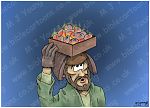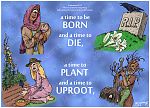Bible Cartoon: <-- Proverbs : Ecclesiastes -->
Click on Add to cart button below shopping cart.
Purchased Bible Cartoons do not have watermarks. Links to Cartoons provided on email once purchase is completed.Ecclesiastes
Book type: Wisdom
Author: Possibly Solomon, or compiled centuries later than Solomon’s time.
No. of chapters: 12
Key character(s): God, the Teacher, an implied pupil or son.
Brief description: Ecclesiastes – Is life worth living?
Sequential outline:
01) Introduction: Life is meaningless because nothing new ever occurs (1:1-11)
02) Wisdom is meaningless (1:12-18)
03) Pleasure & possessions are meaningless (2:1-11)
04) Wisdom is not any better than folly (2:12-17)
05) Labour is meaningless (2:18-26)
06) God plans the world but hides the plan (3:1-11)
07) The rational conclusion: seek to enjoy life (3:12-22)
08) Illustrations: life is without meaning (4:1-16)
09) The wise conclusion: fear God (5:1-7)
10) Wealth is no advantage (5:8-6:12)
11) Proverbs illustrate the way of wisdom (7:1-14)
12) Righteousness is meaningless (7:15-25)
13) The Teacher warns about the wiles & devices of women (7:26-29)
14) Obey the king (8:1-9)
15) Righteousness goes unrewarded (8:10-17)
16) All share the same ultimate fate (9:1-12)
17) Wisdom does not provide the ultimate answer (9:13-10:20)
18) The Teacher calls to action in the face of meaninglessness (11:1-8)
19) The advantage lies with youth (11:9-12:7)
20) Conclusion: everything is meaningless (12:8)
21) Parting advice: hear the experienced Teacher & obey God (12:9-14)
Ecclesiastes is the Greek rendering of the Hebrew word Koheleth (or qoheleth), which means “Preacher” & apparently describes “one who holds or addresses an assembly”.
This book addresses people trying to find meaning and identity.
The book of Ecclesiastes is amazingly applicable to the contemporary scene.
[Source: NIV Disciple’s Study Bible]
Solomon’s book of Ecclesiastes details his mistakes and regret.
The book of Ecclesiastes provides a stark example of how relevant the Old Testament can be in today’s world. The title of the book comes from the Greek word for “preacher” or “teacher.”
King Solomon goes through a list of things he tried in seeking fulfillment: career achievements, materialism, alcohol, pleasure, even wisdom. His conclusion? All of it is “meaningless.” The King James Version of the Bible translates the word as “vanity,” but the New International Version uses “meaningless,” a concept most of us find easier to understand.
Solomon began as a man poised for greatness. Both his wisdom and wealth were legendary in the ancient world. As the son of David and Israel’s third king, he brought peace to the land and launched a massive building program. He began to backslide, however, when he took hundreds of foreign wives and concubines. Solomon let their idolatry influence him as he slipped farther away from the True God.
With its dire warnings and record of futility, Ecclesiastes could be a depressing book, except for its exhortation that true happiness can be found only in God. Written ten centuries before the birth of Jesus Christ, the book of Ecclesiastes urges today’s Christians to seek God first if they want to find purpose in their life.
Solomon is gone, and along with him his riches, palaces, gardens, and wives. His writing, in the pages of the Bible, lives on. The message for today’s Christians is to build a saving relationship with Jesus Christ that guarantees eternal life.
Themes in the Book of Ecclesiates:
The main theme of Ecclesiastes is humanity’s fruitless search for contentment. Solomon’s sub-themes are that contentment cannot be found in human endeavors or material things, while wisdom and knowledge leave too many unanswered questions. This leads to a sense of hollowness. Meaning in life can be found only in a right relationship with God.
[Source: http://christianity.about.com/od/oldtestamentbooks/a/JZ-Book-Of-Ecclesiastes.htm]





